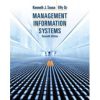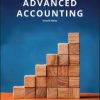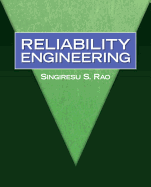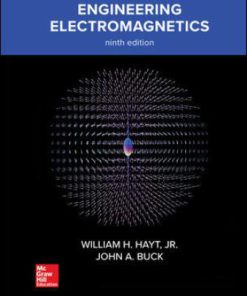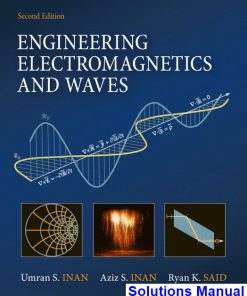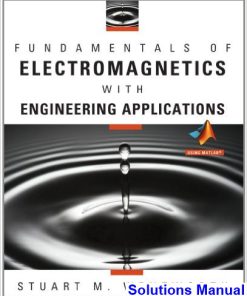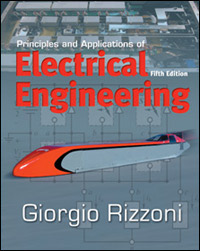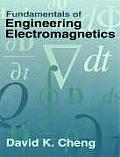Solution Manual for Fundamentals of Electromagnetics for Electrical and Computer Engineering by Rao
$35.00 Original price was: $35.00.$26.50Current price is: $26.50.
Solution Manual for Fundamentals of Electromagnetics for Electrical and Computer Engineering by Rao
Instant download Solution Manual for Fundamentals of Electromagnetics for Electrical and Computer Engineering by Rao pdf docx epub after payment.
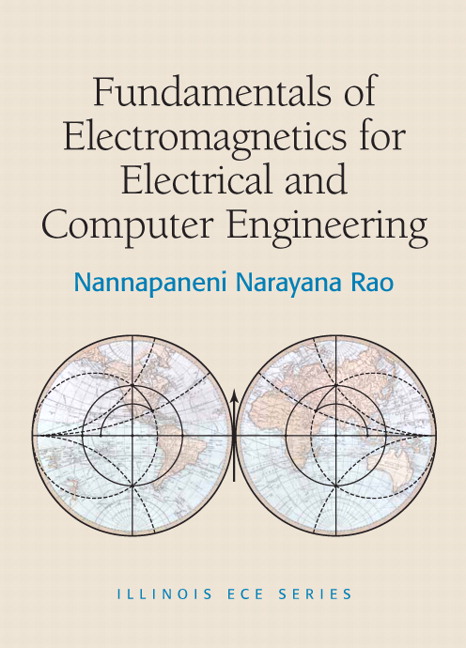
Product details:
- ISBN-10 : 0136013333
- ISBN-13 : 978-0136013334
- Author: Nannapaneni Narayana Rao
“Fundamentals of Electromagnetics for Electrical and Computer Engineering, First Edition “is appropriate for all beginning courses in electromagnetics, in both electrical engineering and computer engineering programs. This is ideal for anyone interested in learning more about electromagnetics. Dr. N. Narayana Rao has designed this compact, one-semester textbook in electromagnetics to fully reflect the evolution of technologies in both electrical and computer engineering. This book’s unique approach begins with Maxwell’s equations for time-varying fields (first in integral and then in differential form), and also introduces waves at the outset. Building on these core concepts, Dr. Rao treats each category of fields as solutions to Maxwell’s equations, highlighting the frequency behavior of physical structures. Next, he systematically introduces the topics of transmission lines, waveguides, and antennas. To keep the subject’s geometry as simple as possible, while ensuring that students master the physical concepts and mathematical tools they will need, Rao makes extensive use of the Cartesian coordinate system. Topics covered in this book include: uniform plane wave propagation; material media and their interaction with uniform plane wave fields; essentials of transmission-line analysis (both frequency- and time-domain); metallic waveguides; and Hertzian dipole field solutions. Material on cylindrical and spherical coordinate systems is presented in appendices, where it can be studied whenever relevant or convenient. Worked examples are presented throughout to illuminate (and in some cases extend) key concepts; each chapter also contains a summary and review questions. “(Note: this book provides a one-semester alternative to Dr. Rao’s classic textbook for two-semester courses, “Elements of Engineering Electromagnetics,” now in its Sixth Edition.)”
Table of contents:
CHAPTER 1 Vectors and Fields 0 1.1 Vector Algebra 1 1.2 Cartesian Coordinate System 9 1.3 Scalar and Vector Fields 13 1.4 Sinusoidally Time-Varying Fields 16 1.5 The Electric Field 21 1.6 The Magnetic Field 27 Summary 31 Review Questions 33 Problems 35 CHAPTER 2 Maxewll's Equations in Integral From 38 2.1 The Line Integral 38 2.2 The Surface Integral 43 2.3 Faraday's Law 49 2.4 Ampere's Circuital Law 54 2.5 Gauss' Law for the Electric Field 59 2.6 Gauss' Law for the Magnetic Field 63 Summary 64 Review Questions 66 Problems 68 CHAPTER 3 Maxwell's Equations in Differential Form 71 3.1 Faraday's Law 71 3.2 Ampere's Circuital Law 78 3.3 Curl and Stokes' Theorem 82 3.4 Gauss' Law for the Electric Field 88 3.5 Gauss' Law for the Magnetic Field 92 3.6 Divergence and the Divergence Theorem 93 Summary 98 Review Questions 102 Problems 103 CHAPTER 4 Wave Propagation in Free Space 106 4.1 The Infinite Plane Current Sheet 106 4.2 Magnetic Field Adjacent to the Current Sheet 108 4.3 Successive Solution of Maxwell's Equations 111 4.4 Solution by Wave Equation 115 4.5 Uniform Plane Waves 118 4.6 Poynting Vector and Energy Storage 129 Summary 133 Review Questions 135 Problems 137 CHAPTER 5 Wave Propagation in Material Media 141 5.1 Conductors and Dielectrics 141 5.2 Magnetic Materials 149 5.3 Wave Equation and Solution 154 5.4 Uniform Plane Waves in Dielectrics and Conductors 161 5.5 Boundary Conditions 166 5.6 Reflection and Transmission of Uniform Plane Waves 173 Summary 177 Review Questions 180 Problems 181 CHAPTER 6 Statics, Quasistatics, and Transmission Lines 186 6.1 Gradient and Electric Potential 186 6.2 Poisson's and Laplace's Equations 192 6.3 Static Fields and Circuit Elements 197 6.4 Low-Frequency Behavior via Quasistatics 205 6.5 The Distributed Circuit Concept and the Parallel-Plate Transmission Line 211 6.6 Transmission Lines with an Arbitrary Cross Section 217 Summary 223 Review Questions 226 Problems 228 CHAPTER 7 Transmission-Line Analysis 232 A Frequency-Domain 232 7.1 Short-Cireuited Line and Frequency Behavior 234 7.2 Transmission-Line Discontinuity 241 7.3 The Smith Chart 246 B Time-Domain 254 7.4 Line Terminated by Resistive Load 256 7.5 Lines with Initial Conditions 266 7.6 1nterconnections between Logic Gates 272 Summary 278 Review Questions 282 Problems 283 CHAPTER 8 Waveguide Principles 290 8.1 Uniform Plane Wave Propagation in an Arbitrary Direction 290 8.2 Transverse Electric Waves in a Parallel-Plate Waveguide 298 8.3 Dispersion and Group Velocity 304 8.4 Rectangular Waveguide and Cavity Resonator 310 8.5 Reflection and Refraction of Plane Waves 316 8.6 Dielectric Slab Guide 325 Summary 331 Review Questions 334 Problems 335 CHAPTER 9 Antenna Basics 339 9.1 Hertzian Dipole 339 9.2 Radiation Resistance and Directivity 347 9.3 Half-Wave Dipole 353 9.4 Antenna Arrays 357 9.5 Image Antennas 361 9.6 Receiving Properties 363 Summary 368 Review Questions 370 Problems 371 CHAPTER 10 Supplem Ntary Topics 375 10.1 Wave Propagation in Ionized Medium 375 10.2 Wave Propagation in Ansotropic Medium 380 10.3 Electromagnetic Compatibility and Shielding 387 10.4 Crosstalk on Transmission Lines 395 10.5 Parallel-Plate Waveguide Discontinuity 403 10.6 Magnetic Vector Potential and the Loop Antenna 406 Appendices 0 Cylindrical and Spherical Coordinate Systems 0 Curl, Divergence, and Gradient in Cylindrical and Spherical Coordinate Systems 0 Units and Dimensions 0 Suggested Collateral and Further Reading 0 Answers to Odd-Numbered Problems 0 Index 0
Library of Congress Subject Headings for this publication:
Electromagnetic theory.
Electric engineering.
Computer engineering.
People also search:
Fundamentals of Electromagnetics for Electrical and Computer Engineering
Fundamentals of Electromagnetics for Electrical and Computer Engineering pdf
Fundamentals of Electromagnetics for Electrical and Computer Engineering
are electromagnetic waves made of electrons
are electromagnetic waves bad for you
are electromagnetic waves dangerous
You may also like…
Solution Manual
Solution Manual for Engineering Electromagnetics, 9th Edition, William Hayt John Buck
Solution Manual
Solution Manual
Solution Manual for Principles and Applications of Electrical Engineering, 5/e. Giorgio Rizzoni
Solution Manual
Solutions Manual to accompany Fundamentals of Engineering Electromagnetics 9780201566116
Solution Manual
Solution Manual for Electrical Engineering: Concepts and Applications S.A. Reza Zekavat


